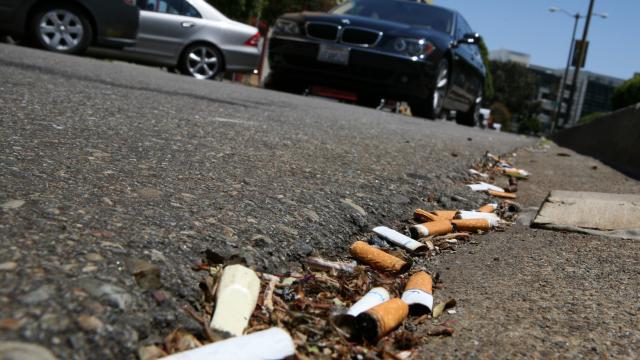Some scientists have had it up to here with cigarette butts, particularly those from cigarettes with filtered plastic tips. In a new op-ed this week, researchers have called for a global ban of filtered cigarettes, pointing out that the products aren’t any safer for us (as was once commonly advertised). In addition, they’re one of the most common sources of plastic pollution in the world.
Filtered cigarettes were first invented in the 1950s, and primarily made using a synthetic plastic called cellulose acetate (at one point, asbestos was also used). Initially, as the exploration of tobacco industry documents during that time has revealed, they were legitimately devised as a way to reduce people’s exposure to the many chemicals in cigarette smoke that industry and outside scientists were starting to suspect could cause cancer, particularly tar. But it soon became apparent they didn’t really move the needle at all and may even increase people’s risk of cancer.
While these filters might block some larger particles of tar and other chemicals that makes cigarette smoke feels the way it does, for instance, they do nothing about the smaller particles that penetrate deeper into the lungs. The filters even encourage people to inhale higher quantities of smoke at a time, since the cigarettes feel less irritating and users will still want to get the same buzz they’d get from the non-filtered kind. And although cellulose acetate can quickly degrade in a matter of months under the right conditions, cigarette butts thrown out in the open are more likely to take up to a decade to go away.
That makes them more than a health hazard. In a world increasingly overwhelmed by plastic pollution, discarded filters only add to a growing problem. A Chinese ban on accepting recyclable plastic could create 111 million tons of orphaned plastic by 2030.
Microplastics are being found all over the place from the air to beer. Discarded cigarette butts are just adding to the growing problem.
Despite mounting evidence of their inefficacy and their environmental toll, the tobacco industry, unsurprisingly, kept pretending their filtered cigarettes were healthier. They went so far as to change the filter’s formula so it would become discoloured when the cigarette was smoked and trick the user into thinking it was doing something. They also added other dubious innovations that would supposedly reduce the amount of smoke inhaled by users, such as tiny holes in the filter. For decades, they marketed these products as “light,” “low-tar,” or “mild,” and it’s only recently that countries like the U.S. and elsewhere have banned that sort of branding.
In their editorial published Thursday in the BMJ, researchers from the London School of Hygiene and Tropical Medicine in the UK argue that governments should go one step further and just ban filters entirely. They point out that not only do these filters do nothing for users, they’ve also become the single most ubiquitous piece of trash in the world, according to some estimates. And these butts aren’t just unpleasant to look at, they might be hurting the surrounding plant and wildlife.
“Even though the cellulose acetate filter is the single most commonly collected item of litter globally, the industry has largely succeeded in avoiding the public outrage expressed towards plastic waste produced by, for example, McDonald’s and Starbucks,” they wrote. Even as the European Union has a plan to phase many single-use plastic products by 2021 (including straws), for example, filtered cigarettes aren’t included in the ban.
The logistics of outright getting rid of cigarette filters might seem daunting, given that the vast majority of cigarettes are now made with them. But it wouldn’t be the first time that governments have stepped in to dramatically curtail the industry, the authors noted. And over the past few decades, these interventions have actually worked to steadily reduce the smoking rate in many developed countries. A filtered cigarette ban, they argue, should just be part of the global push needed to wean the world off tobacco altogether.
“The idea that a pack of cigarettes would be restricted to plain packaging with graphic warnings seemed unthinkable,” they wrote. “It may be time for a similar radical approach that strengthens ties between the environment and health communities for the common planetary good. If we fail to reduce the trillions of butts added to the world’s waste burden annually, we undermine our efforts to curb global plastic waste and miss an opportunity to help end the global tobacco epidemic.”
